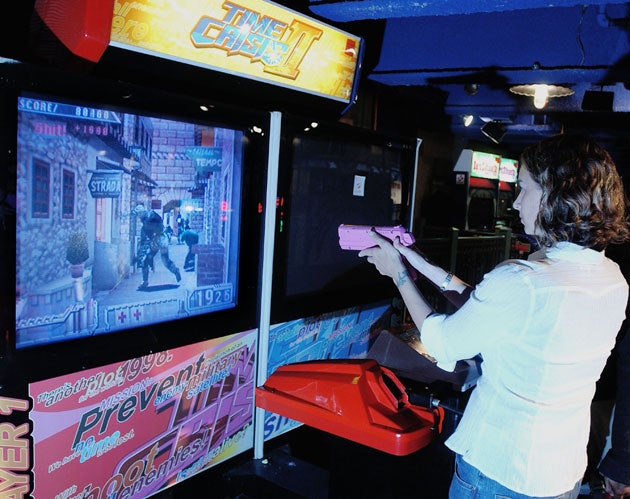Is banning violent video games the right answer? Venezuela thinks so

Shouts of "Kill him! Kill him!" ring out as the preteens train their virtual assault rifles on the last remaining terrorist and spray him with bullets. Blood splatters. The enemy collapses. And they cheerfully wrap up another game of Counter-Strike.
The most popular video games among kids often imitate life outside this internet cafe in San Augustin - one of the many crime-ridden slums in Venezuela's capital, where residents say too many of the young players easily trade joysticks for guns.
In a bid to curb that trend, Venezuela's National Assembly is on track to prohibit violent video games and toys. The proposed legislation, which received initial approval in September, is expected to get a final vote in the coming weeks.
Parents applaud the proposed ban. But critics argue the bill is little more than a public relations stunt by supporters of President Hugo Chavez to camouflage his government's inability to deal with Venezuela's rampant violent crime - the country's most pressing problem according to public opinion polls.
Chavez's government stopped releasing complete annual murder figures in 2005 amid rising concerns. But last year, the Justice Ministry said homicides averaged 152 a week, or roughly 7,900 for the year. That's more than five times the murder rate in Texas, which has roughly the same population as Venezuela.
As manager of the cafe in San Augustin, Jenny Rangel struggles with a moral dilemma as she stands beneath a Scarface movie poster and watches the virtual shoot-'em-up. Like many of her neighbours, Rangel rushes home at nightfall before gunshots begin echoing through the barrio.
"The message for them is that you must shoot and kill," Rangel said.
Across town from San Augustin, shopping mall arcades are packed with children and teenagers from mostly middle-class and wealthy families who wait in line to play Dark Silhouette - featuring a life-size assault rifle that players use to gun down opponents.
"Video games aren't the problem, criminals are the problem. Why don't they go after them?" asked Arny Gonzalez, a 17-year-old high school student.
Lawmaker Jose Albornoz concedes that fighting crime requires a multifaceted approach. But he's convinced that authorities can reduce the murder rate by breaking what he says is a direct link between video games and crime - though most studies find no evidence that such games prompt violent behaviour in youngsters.
"Some believe they actually can serve as a substitute, kids get rid of their rage through the game instead of acting out," said criminologist Roberto Briceno, who tracks crime at the Venezuelan Violence Observatory, an academic think-tank in Caracas.
When the legislation first went to the floor in the predominantly pro-Chavez legislature, lawmakers watched images from the popular Grand Theft Auto game showing a man pulling people out of their cars and severely beating them before stealing the vehicles.
"That's what our children are learning from these games, and it cannot continue," Albornoz said from the podium, waving a plastic toy machine gun for emphasis.
Venezuela would be one of few countries to impose an all-out ban on the "manufacture, importation, distribution, sales and use of violent video games and bellicose toys."
The proposed law would give Venezuela's consumer protection agency the discretion to define what products should be prohibited and impose fines as high as $128,000 (£80,000).
Similar concerns have prompted many countries, including Brazil, Germany and China, to prohibit the sale of specific video games. Most, including the United States, have opted for ratings systems to warn parents and users of violent or sexual content.
The Venezuelan bill would mandate crime prevention classes in public schools and force the media to "implement permanent campaigns" to warn against the dangers of violent games.
Another provision requires the government "to promote the production, distribution, sales and use" of games that teach kids "respect for an adversary."
Some 2,000 people marched across Venezuela's capital Saturday to protest what they call widespread persecution of Chavez's opponents.
"It's a bit ironic that supporters of Chavez, who persecutes his political opponents, want to teach our children the need for respect," quipped Tomas Sanchez, an opposition lawmaker who broke ranks with Chavez.
The law could shutter some retailers, arcades and internet cafes. But the country's thriving market for pirated video games will likely be untouched by the law - another irony pinpointed by Chavez critics.
Most vendors of pirated goods are from the working class, Chavez's core constituency, and they ply their illegal yet tolerated trade on street corners in cities and towns across the country.
Albornoz said such vendors should start thinking about exchanging the likes of Grand Theft Auto for non-aggressive games, saying: "There are alternatives that can be just as fun."
At the same time, the understaffed consumer-protection agency would be hard pressed to effectively enforce the ban.
Its 163 inspectors spend most of their time struggling to ensure that grocery stores don't flout food price controls aimed at stemming another huge Venezuelan problem - double-digit inflation.
"It's a facade that allows them to say they are doing something to lower the crime rate," Sanchez said, "while hiding the fact that existing policies have failed."
Bookmark popover
Removed from bookmarks